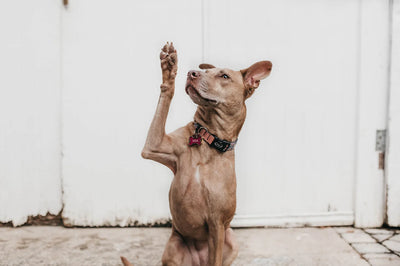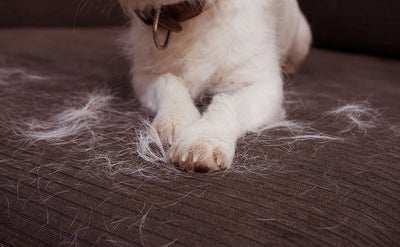It can be ruff working out what things you need for a puppy, especially if you’re a first time pawrent. That’s why we’ve created a list of puppy essentials to make sure you and your furball start out on the right paw.

So you’re getting a new puppy… congrats (and send pics)! Getting a puppy is exciting and terrifying, you’re adding another member to your family – and they don’t speak English! How are you supposed to know what they need and when they need it? That’s where our new puppy checklist comes in.
For your puppy, it’s equally daunting. They’re exposed to a completely new environment with unfamiliar smells, sounds and people. It’s frightening being surrounded by the unfamiliar, especially when they’re young.
Having the puppy essentials on hand goes a long way in making their first few days, weeks and months a walk in the park. So, what do you need for a puppy?
Puppy essentials for your home
So, what do you need for a puppy? Before you bring your puppy home, you should puppy-proof your house. Create a safe space for your new best friend, free from power cords, chemicals, cockroach baits and toxic houseplants.
Puppy-proofing early also sets you up for success in the training department. It helps your puppy learn what’s theirs and what’s off-limits – like your favourite couch cushions, those are definitely off-limits...
1. A blanket from home
One of the most important things you need for a puppy is a blanket that smells like their siblings. Your puppy’s new home is scary. It’s unfamiliar and full of new sights and sounds. To help them settle in, ask your breeder for a blanket or toy that smells like their siblings. This way, they have a little piece of familiarity on their first few nights when everything seems foreign and frightening.
2. Dog toilet/puppy pads
Puppy pads should be high on your new puppy checklist. In an ideal world, your puppy would do their business outside, but if your pup isn’t fully vaccinated, your backyard isn’t puppy-proof or they’re still too young to be left outside for long, establishing an outside toilet area may not be possible – and accidents are inevitable. Plus, it’s hard to hold your bladder when you’re eight weeks old! Purchase some puppy pads or a dog toilet so if they have an accident, it isn’t such an annoyance.
3. Off spray/cleaning spray that isn’t toxic to dogs
Puppies and cleaning go hand-in-hand. It’s no surprise that when it comes to puppy essentials, cleaning supplies are top of mind. Buy some non-toxic cleaning products – and look for products with ‘pet-friendly’ on the packaging. This way you can clean up your pup’s business without worry.
Another puppy essential is ‘dog off’ spray. This is a product that tastes or smells bad, so when applied to walls or furniture, it deters dogs from chewing them. This helps establish what your puppy can and can’t chew on. It’s great to start spraying your space as early as possible so that your pup learns what’s off-limits and what’s fair game.
4. Puppy gates
Add a playpen to your new puppy checklist, stat! Creating a playpen (or using a crate) helps keep your puppy safe in their first few weeks and months. Whether you’re doing housework with chemicals that you don’t want them to ingest, or they’ve run a muck in the backyard and you don’t want their dirty mitts walking through the house, a contained space for your puppy will help to create a safe space for them. If they eat, sleep and play there, they’re likely to feel right at home in their space while you pop out to the shops and leave them to their own devices for the first time.
5. A couple of soft, plush toys Toys
Puppy teeth can really pack a punch. Toys are a great way to redirect your puppy’s sharp pins from hands and feet. Since your fur baby’s teeth are still growing they need a soft, plush toy that won’t splinter teeth and isn’t easily swallowable.
6. A snuggly bed
A well-rested puppy is a well-behaved puppy. After a long day of exploring the world, your woofer needs a comfy, snuggly place to sleep. Look for a bed your puppy can snuggle into and seek refuge when the world feels too big and scary. Go for a bed with raised rims that they can burrow into (Troopet’s Rectangle Dog Bed and Round Dog Bed are great options).
Depending on the breed, you may want to look for a slightly bigger bed than what your puppy will need so they have room to grow.

7. A cosy kennel
With your puppy sleeping inside in their first few weeks, a kennel can feel like an unnecessary item. However, if you’re planning on transitioning your dog to sleeping outside (or even spending time outside while you’re at work) it’s a good idea to add a kennel to your new puppy checklist.
If you want your pupper to sleep outside eventually, get them sleeping in their kennel from the outset. This gets them used to sleeping in their kennel and means it isn’t such a shock to the system when you transition them outside.
Puppy essentials for their health
Your puppy’s health is paramount, but it’s hard to know what to do and when. We recommend booking an appointment with your vet before or just after your puppy arrives. Ask them about the puppy essentials related to health, like when your puppy should be vaccinated, whether they should have worming treatments, and if there are any breed-specific health issues you should be aware of.
Aside from sorting out their vaccination schedule, there are some puppy essentials to add to your list when it comes to your pup’s health and grooming regime. Here’s the things you need for a puppy’s health...
1. Grooming tools
It’s a well-known fact that most doggos don’t like being groomed. So, although your furry friend may not need a huge grooming routine when they’re young, it’s important to familiarise them with the process early on. The main reason dogs don’t like being groomed, brushed and bathed is that they aren’t used to it. They weren’t expecting you to prod and pull at them, so of course, they get upset.
Add grooming tools to your new puppy checklist, so you can familiarise them with the process. If you start brushing and bathing them when they’re young, they’re much less likely to balk at the sight of their brush.
The grooming tools your puppy needs vary by breed. If you’re not sure which brush/deshedding tool to add to your new puppy checklist, bark at us, and we’ll get in touch!

2. Shampoo and conditioner
Whether you’ve brought home a dachshund or poodle, it’s a sure bet they’re going to get up to mischief – and mischief usually leads to a dirty, smelly doggo. That’s where a high-quality shampoo and conditioner comes to the rescue.
Prep for your puppy by equipping yourself with a shampoo and conditioner that will wash away dirt and grime without irritating your puppy’s skin. Our 2-in-1 does the trick! This way you’re not caught out when they step in poo or roll around in the mud (you’d be surprised by how often a dog gets dirty).
3. A Pet insurance or saving plan
One of the often-overlooked things you need for a puppy is a plan for vet bills. Explore pet insurance options before your puppy arrives. Talk to your vet and other pet pals about their experience and whether they’ve found pet insurance to be worthwhile.
Another option is to start a savings plan and put away money each month for emergencies. Whichever option you choose, when it comes to vet bills, failing to plan is planning to fail. Health issues are often unexpected and can snowball quickly. By putting money aside, you can worry about what matters: your dog’s health.
Puppy essentials for the kitchen
Choosing the right dog food is the key to your floof living its best life. It’s important to do your research so you can find dog food that’s not only suitable for puppies, but is also the best choice for your puppy’s breed.
1. Puppy food
Puppies have a lot of growing to do, which is why they need a diet packed with protein.
Before you start food shopping, ask your breeder what they’re currently feeding your puppy. Essentially, any big changes in your woofer’s diet, especially when they’re a puppy, can cause tummy trouble. Try to either mimic their current diet or gradually transition them from one food to another.
Look for labelling that specifies a food is made for puppies. Puppies have different nutrient needs to their older brothers and sisters and should be eating differently. If you’re stuck on what to feed them, give Vetalogica’s drool-worthy grain-free Chicken Puppy Food a go!
2. Treats
Your puppy’s training begins the moment they see you. Have treats ready to coax them into the car and make their first night with you a happy one (even a worried woofer is partial to a treat or two).
Treats are integral to training your puppy in their first few weeks and months. They help you create safe spaces (if your dog’s bed always has treatos in it, they’ll learn to love being in it), and teach them their first commands.
Look for puppy-friendly treats that can’t be easily swallowed, aren’t too high in fat, and won’t splinter (bones aren’t recommended for puppies as they’re a choking hazard and may splinter while your puppy chews them).
3. Food and water bowls
You’ll need a couple of Food and water bowls on hand for when your puppy arrives home, even if they aren't eating out of a bowl yet. This is because it’s vital to have water on hand at all times (ideally in a couple of locations around the house) in case your woofer gets thirsty.
Puppy essentials for on the go
It’s always a good idea to be prepped for adventures. Whether it’s a walk around the block or a drive to the coffee shop, adding travel accessories to your new puppy checklist means you’re always ready for you and your pup’s next adventure.
1. Collar, harness and lead
Your puppy needs a collar, lead and harness.
When choosing a collar, it’s best to try (or measure) before you buy. Ask your breeder if they will provide a collar (many do). If they don’t, they can provide measurements to make sure you get the right fit.
When it comes to leads, it’s a good idea to purchase them early so you can get your puppy used to the sensation of walking on a lead. This way they’re not surprised when you first leave the house and there’s a rope attached to them. Go for a light, thin lead – too bulky and it will scare or spook your puppy.
Most dogs, especially bigger breeds, will also need a harness for walking. These will give you a safer, more comfortable way to walk your dog, especially if they’re partial to pulling on the lead.
2. Car carrier and seat cover
Whether it’s bringing your puppy home for the first time, or setting off on adventures once they’re fully vaccinated, it’s important to prepare your vehicle so it’s safe and comfortable for your furry friend.
A seat cover or hammock for your car will protect your back seats and give a little grip under-paw. You’ll also need a seatbelt attachment to keep them safe and secure.
Otherwise, if you’re after something cosier, a pet carrier is a great option. This gives your puppy their own space and protects your vehicle from dirt and grime.
3. ID tag
Before you and your pupper have your first outing, make sure they’re microchipped, registered with your local council, and have an ID tag with your name and phone number. By preparing for the worst, you’re making sure you’ve done everything possible to keep them safe if (touch wood) they ever escape or get lost.
If you’re looking for products for your pup, we’ve got you covered. We have toys to power up playtime and shampoo and conditioner to calm down bath time; our treats make training trouble-free.



